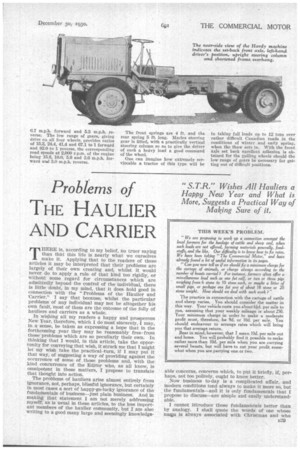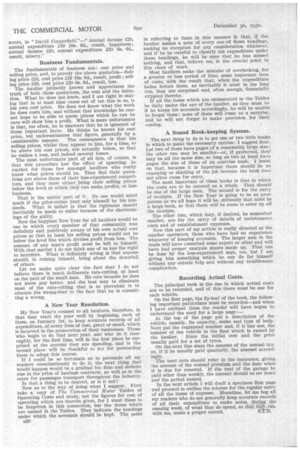Problems of
Page 43

Page 44

If you've noticed an error in this article please click here to report it so we can fix it.
THE HAULIER
AND CARRIER
" S.T.R." Wishes All Hauliers a Happy New Year and What is More, Suggests a Practical Way of Making Sure of it,
THERE is, according to my belief, no truer saying than that this life is nearly what we ourselves make it. Applying that to the readers of these articles it may be interpreted that their problems are largely of their own creating and, whilst it would never do to apply a rule of that kind too rigidly, or without some regard for circumstances which are admittedly beyond the control of the• individual, there is little doubt, in my mind, that it does hold good in connection with the "Problems of the Haulier and Carrier." I say that because, whilst the particular problems of any individual may not be altogether his own fault, most of them are the outcome of the folly of hauliers and carriers as a whole.
In wishing all my readers a happy and prosperous New Year, therefore, which I do most sincerely, I may, in a sense, be taken as expressing a hope that in the forthcoming year they may be reasonably free 'from those problems which are so peculiarly their own. In thinking that I would, in this article, take the opportunity for conveying that wish, it struck me that I might let my wish take the practicalturn, if I may put it that way, of suggesting a way of providing against the occurrence of some of those problems and, with the kind concurrence of the Editor who, as all know, is omnipotent in these matters, I propose to translate that thought into action.
The problems of hauliers arise almost entirely from ignorance, not, perhaps, blissful ignorance, but certainly in most cases a sort of happy-go-lucky ignorance of the fundamentals of business--just plain business. And in making that statement I am not merely addressing myself, as is usual in these articles, to the less important members of the haulier community, but I am also writing to a good many large and seemingly knowledge able concerns, concerns which, to put it briefly, if, perhaps, not too politely, ought to know better.
Now business to-day is a complicated affair, and modern conditions tend always to make it more so, but the fundamentals—ana it is only fundamentals that I propose to discuss—are siniple and easily understandable.
I cannot introduce those fundamentals better than by analogy. I shall quote the words of one whose Haw Ls always associated with Christmas and who B29 wrote, in "David Copperfield "—" Annual income £20, annual expenditure £19 19s. 6d., result, happiness ; annual income £20, annual expenditure 120 Os. 6d., result, misery."
Business Fundamentals.
The fundamentals of business are: cost price and selling price, and, to parody the above quotation—Selling price £20, cost price £19 19s. 6d., result, profit; selling price 120, cost price 120 Os. 6d., result, loss.
The haulier probably knows and appreciates the truth of both those quotations, the real and the imitation. What he does not know, and I am right in stating that in at least nine cases out of ten this is so, is his own cost price. He does not know what the work he does costs him, and without that knowledge he cannot hope to be able to quote prices which he can be sure will show him a profit. What is more unfortunate is that, too often, he is unaware that he is ignorant of those important facts. He thinks he knows his cost price, but underestimates that figure, generally by a considerable amount. The consequence is that his selling prices, whilst they appear to him, for a time, to be above his cost prices, are actually below, so that he makes a Joss, and indeed several losses.
The most unfortunate part of all this, of course, is that this procedure has the effect of upsetting In, market for those few amongst hauliers who really know what prices should be. They find their quotations are above those of their less-experienced competitors, and they must either bring their selling prices below the level at which they can make,profits, or lose business.
That is the unfair part of it. No one would mind much if the price-cutter hurt only himself by his misdeeds. What is unfair is that the righteous should inevitably be made to suffer because of the shortcomings of the guilty.
Now the happiest New Year for all hauliers would be one in which every member of that community was definitely and positively aware of his own actual cost prices so that at least his selling prices would not be below the level line which divides profit from loss. The amount of any man's profit must be left to himself. With that matter I do not think any of us has the right to interfere. What is definitely wrong is that anyone should, in ruining himself, bring about the downfall of others.
Let me make quite clear the fact -that I do not believe there is much deliberate rate-cutting, at least on the part of the small man. He cuts because he does not know any better, and the best way to eliminate most of the rate-cutting that is so prevalent is to educate the wrong-doer to the fact that he is committing a wrong.
A New Year Resolution.
My New Year's counsel to all hauliers, therefore, is that they start the year well by beginning, each of them, on January 1st, to keep accurate records of all expenditure, of every item of cost, great or small, which is incurred in the prosecution of their businesses. Those who begin to do that next year, and who do it thoroughly, for the first time, will in the 'first place be surprised at the amount they are spending, and in the second place will be thankful to nce for persuading them to adopt this course.
If I could be so fortunate as to persuade all my readers conscientiously to do it, the next thing that would happen would be a gradual but firm and definite rise in the price of haulage contracts, as well as in the rates for passenger transport throughout the industry.
Is that a thing to he desired, or is it not?
Now as to the way of doing what I suggest. First take a copy of The Commercial Motor Tables of Operating Costs and study, not the figures for cost of operating which are therein given, for I want those to be forgotten in this connection, but the items which are named in the Tables. They indicate the headings under which the accounts should be. kept. The point B,30 in referring to them in this manner is that, if the haulier makes a note of every one of those headings, making no exception for any consideration whatever, and if he be careful to classify his expenditure under those headings, he will be sure that he has missed nothing, and that, believe me, is the crucial point in this class of work.
Most hauliers make the mistake of overlooking, for a greater or less period of time, some important item of costs, with the result that, when the expenditure loolne before them, as inevitably it must in the long run, they are surprised and, often enough, financially crippled thereby.
. If all the items which are enumerated in the Tables be daily under the eye of the haulier, as they must be if he keeps his accounts accordingly, he will be unable to forget them : none of them will come as a surprise, and he will not forget to make provision for their coming.
A Sound Book-keeping System.
The next thing to do is to get one or two little books in which to make the necessary entries : I suggest four. Let two of them have pages of a reasonably large size: the other two may be smaller—or, if preferred, they' may be all the same size, so long as two at least have pages the size of those of an exercise book. I insist on that, because it is important there should be no cramping or shirking of the job because the book does not allow room for entry.
The most important of these books is that in which the costs are to be entered as a whole. That should be one of the large ones. The second is for the entry of receipts. If the New Year is going to be as prosperous as we all hope it will be, obviously that must be a large book, so that there will be room to enter up all the receipts.
The other two, which may, if desired, be somewhat smaller, are for the entryof details of maintenance costs and of establishment expenses.
Now this part of my article is really directed at the smaller operators, those who have had no experience whatever of keeping accounts. The larger men in the trade will have consulted some expert or other and will have had proper analysis sheets made up. That can be done by the less-experienced man, too, but I am giving him something which he can do for himself without any outside help and without any troublesome complication.
Recording Actual Costs.
The principal book is the one in which actual costs are to be recorded, and of this there must be one for each vehicle.
On the first page, the fly-leaf of the book, the following important particulars must be recorded—and when I have outlined them the reader will have begun to understand the need for a large page:— At the top of the page put a description of the vehicle, namely, its capacity, make and type of body. Next put the registered number and, if it has one, the number of the vehicle in the fleet which is owned by the haulier. State the initial cost and the price usually paid for a set of tyres.
On the next line state the amount of the annual tax, or, if it be usually paid quarterly, the amount accordingly.
The next note should refer to the insurance, giving the amount of the annual premium and the date when it is due for renewal. It the rent of the garage be paid other than weekly, the amount should be set down and the period named.
In the next article I will draft a specimen first page and proceed to outline the scheme for the regular entry of all the items of expense. Meantime, let me beg all my readers who do not generally keep accurate records of all their expenditure to make notes, during the ensuing week, of what they do spend, so that WO, can, with me, make a proper record.




























































































